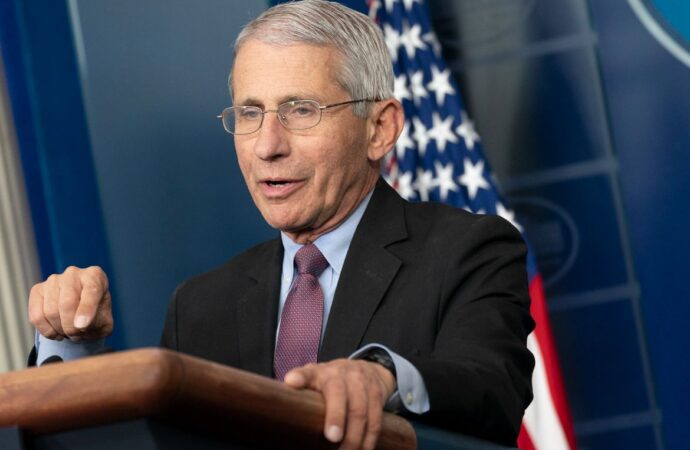Fauci’s problem isn’t just with Judge Kathryn Kimball Mizelle. His problem is with the American system.
Dr. Fauci last week expressed dismay that a federal judge saw fit to block the Centers for Disease Control’s transport mask mandate.
Speaking to CNN’s Kasie Hunt, Fauci made it clear he didn’t just disagree with the legal reasoning of Judge Kathryn Kimball Mizelle—who’s opinion he described as “unsound”—but was upset that the judicial branch more broadly had the authority to block CDC public health edicts.
“Those types of things really are the purview of the CDC. This is a public health issue,” Fauci said. “We are concerned about that—about courts getting involved in things that are unequivocally public health decisions. I mean, this is a CDC issue; it should not be a court issue.”
It’s clear from this statement that Fauci’s problem isn’t with Mizelle. His problem is with the American system, which is built on a series of checks and balances on government power.
Judicial review is a legal concept that stretches all the way back to Marbury vs. Madison (1803), a historic case involving a dispute over Supreme Court seats. The ruling, handed down by Supreme Court Justice John Marshall, marked the first time that federal courts overturned an act of Congress.
“The powers of the legislature are defined and limited; and that those limits may not be mistaken or forgotten, the constitution is written,” Marshall wrote.
Marbury enshrined the idea that courts would ultimately be the arbiter of which laws are constitutional. Embedded in the ruling was an idea that traced back to the Magna Carta: power was only legitimately exercised if it corresponded with “the law of the land.”
Mizelle alluded to this idea in her ruling.
“Our system does not permit agencies to act unlawfully even in pursuit of desirable ends,” Mizelle wrote.
When Fauci says “there’s no place for the courts” to interfere with CDC policy, he’s explicitly rejecting a bedrock principle of the American system: checks and balances. His vision of public health would seem to more closely resemble that of China, where the Chinese Communist Party doesn’t have to worry about its authoritarian edicts being overturned by pesky courts.
There may be some advantages to such a system (though I struggle to think of them), but the absence of such checks on power are the very definition of tyranny, James Madison warned.
“The accumulation of all powers, legislative, executive, and judiciary, in the same hands, whether of one, a few, or many, and whether hereditary, self-appointed, or elective,” Madison wrote, “may justly be pronounced the very definition of tyranny.”
Now, to be fair, few of us are equipped to answer the larger legal question: did the CDC’s transport mask mandate pass constitutional muster? But there are simple clues we can find which point to the answer.
Among the reasons Mizelle cites for striking down the CDC’s order is that the agency didn’t seek public comment or adequately explain its reasoning.
But what about that random clinical trial the CDC conducted that shows cloth mask mandates in airplanes reduce the spread of the virus? Well, there is no such study.
As Vinay Prasad noted on Substack, the CDC never even bothered to conduct any such trials.
“The CDC ran no studies. No one knows the answer to these questions, despite their bluster,” wrote Prasad, a professor of Epidemiology and Biostatistics at the University of California, San Francisco.
Now, I’m not a scientist, but it’s my understanding that empirical evidence is a key component of science and public health. Its absence here leads to an important but unavoidable truth.
“The CDC failed [its] social contract,” Prasad correctly noted. “It implemented a policy and never generated evidence.”
Mask mandate supporters should not be angry with Mizelle or the U.S. system of checks and balances. They should be angry with the CDC, which—two years into the pandemic now—never bothered to produce empirical evidence supporting their policy.
If Dr. Fauci doesn’t like the legal outcome of the CDC’s transport mask mandate, he should blame the bureaucrats at his sister agency—not the checks and balances of the American system that protect us all from concentrated power.
This article is republished with permission from Foundation for Economic Education and was adapted from an issue of the FEE Daily email newsletter.
















1 Comment
What We’re Reading: Vax Vacated, Deadly Green Energy, Anybody But Biden … And More – Issues & Insights
April 29, 2022, 8:46 pm[…] James Madison Would Be Appalled at Fauci’s Contempt for Checks and Balances — Intellectual Takeout […]
REPLY